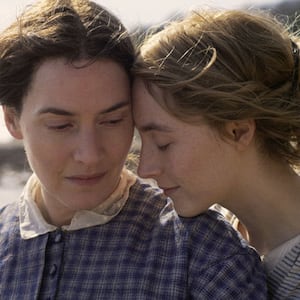Good Joe Bell is the kind of film in which everything from the screenplay to the performances and the story that it’s based on are all melted together in some cinematic blacksmith’s shop to forge a sledgehammer specifically meant to pummel your heart into pieces.
The film, which premiered this week at the Toronto International Film Festival, certainly does just that—though the way it wields that club, like other films at this year’s virtual event, raises some concerns along the way. The brute force misses the point.
In 2013, Jadin Bell, a 15-year-old in La Grande, Oregon, committed suicide after the horrific bullying he endured because he was gay. The tragedy garnered national attention at a crisis moment for youth and gay bullying and the alarming spike in LGBT+ teen suicide rates.
Bell’s story became even more high-profile six months later when his father, Joe, embarked on a walk across America from Oregon to New York City, where Jadin one day wanted to end up, on a mission to raise awareness for the dangers of bullying and start a dialogue about inclusivity and acceptance. Joe’s walk ended when he was struck by a truck on the side of the road in Colorado, dying at the scene.
It’s heartbreak compounded by horror amplified by doom, a wrenching tale that screenwriters Larry McMurtry and Diana Ossana, reuniting 15 years after their Oscar-winning Brokeback Mountain script, wring every possible tear and trauma from.
It’s both clever and cruel that the film, directed by Reinaldo Marcus Green, begins the narrative with the fantasy-fulfillment of Jadin embarking on the walk with Joe, as if it were a bonding journey for a father and his gay son whose relationship turned rocky after the coming-out; a walk toward forgiveness, understanding, and amends.
Especially if you weren’t already familiar with the Bell story, the crass “twist” that the Jadin you’re seeing with Joe is merely a spirit guide and that the teen actually hanged himself in a school playground six months prior swings in like an emotional wrecking ball. There’s a delicate wall erected between human insight and the exploitation of queer pain, and the film bashes straight through it.
Is it possible to do the mental and emotional gymnastics required to contextualize this monumental tragedy of a gay teen and the LGBT suicide epidemic through the gaze of a straight dad’s moral redemption? Just as they did with Green Book’s race relations, we expect audiences will be more than agile in that regard. There’s value in that emotional satisfaction.
But it speaks to the inherent tension that a film like this is complicated to discuss.
This started before the film even premiered at TIFF, when it was announced that Mark Wahlberg was cast as Joe Bell. A notoriously macho Hollywood star like Wahlberg is exactly the kind of casting expected and arguably required for Joe, and the film is centered around the actor’s engaged and deeply felt performance. But the optics still seem questionable to many.
On Twitter, people pointed out longstanding rumors that Wahlberg allegedly turned down Brokeback Mountain because he was “creeped out” by the content of the script.
Recently, after he posted support for Black Lives Matter on social media, commenters called out his past hate-crime conviction.
Wahlberg has spoken over the years about his regret, evolution, and path to redemption, and arguably that path could include an art-imitating-life arc like the one Joe Bell journeys in this film. There are still those critics, however, who find it obtuse to cast an actor with that past in a movie that memorializes a gay teen’s suicide with a message of inclusivity and acceptance.
Whether any of this is a roadblock to enjoying or being touched by the film remains to be seen. The acting, especially from newcomer Reid Miller as Jadin, is excellent. And we suspect narrow minds will surely be opened by its poignant, if heavy-handed, message, just as we expect there to be exasperation over this being how this story is centered and told.
It’s interesting to look at Good Joe Bell as a companion piece to Falling, which also played at this year’s festival. (Fathers and their gay sons are really going through it this year at TIFF.)
The film was written, directed by and stars Viggo Mortensen. It continues its festival run and awards hopes after a debut this winter at Sundance, and is susceptible to the same criticism and praise that makes Good Joe Bell such a lightning rod.
As he told Variety, Mortensen was inspired to write Falling after the death of his mother, a tragedy that found him spelunking buried memories of life with her and his father, remembrances that were then transposed through the lens of a fictional family because, he told the publication, “As the English philosopher Francis Bacon once said: ‘Truth is so hard to tell, it sometimes needs fiction to make it plausible.’”
That fiction is the story of a gay man named John, played by Mortensen, living in California with his husband and their daughter. His father is suffering from the onset of dementia and is struggling to keep up the family farm alone, so John both hosts his dad in California and stays with him at the farm. The sudden proximity forces them to confront their contentious relationship, which has been colored by homophobia, resentment, and abandonment.
Like Good Joe Bell, it is affecting. Thanks to a towering performance by Lance Henriksen as John’s father, it could be an eye-opening entrée into the complicated dynamics of two men forced to evolve together reluctantly, bound by family duty and bond to find common ground in the face of spite, anger, and hurt. Yet there are also strange optics here.
Why, in fictionalizing his family’s story, would Mortensen make his stand-in character gay, thus forcing all of the dramatic tension to orbit around hideous, bigoted outbursts from Henriksen’s character? He spews an artillery of homophobic, emasculating, and offensive dialogue that, while believable for a character of his age and upbringing, is nonetheless upsetting to witness and hear.
The film is a strong directorial debut and refreshingly unpretentious. But why this particular brand of ugliness? Why this story?
The conversation of who should be telling the stories of those who are marginalized and underrepresented is a complicated and ongoing one, and neither of these films are going to satisfy those tired of watching the struggle for queer acceptance filtered through straight characters’ journeys and crafted by straight creative teams. That shouldn’t wholly discount any of the achievement of these films, but it’s a worthy consideration.
The truth is that Good Joe Bell does spend time in flashbacks attempting to add humanity and context to Jadin’s life before his suicide, though those flashbacks are relentless in their negativity and trauma. And a father’s journey to processing his son’s death and whether he was supportive enough when he was alive is a valid and earned story, especially when it comes to Joe Bell, who transferred that internal reckoning into a public-service mission before his own sudden death.
We’re struck by how, even in a virtual and smaller-scale festival season, there are actually a breadth of options when it comes to the telling of queer stories, a situation which allows for more expansive thinking and generosity than when there are only isolated projects to watch.
Francis Lee’s Ammonite, starring Kate Winslet and Saoirse Ronan, is refreshingly casual and frank about desire and sex. In addition to being one of the strongest films playing at TIFF this year, Summer of 85, from French director François Ozon, is a sumptuous and insightful lens into the unsettling and invigorating thrill of teen sexuality and love.
There’s a lot to choose from. The question is, as always, what will—and what deserves to—be amplified.



